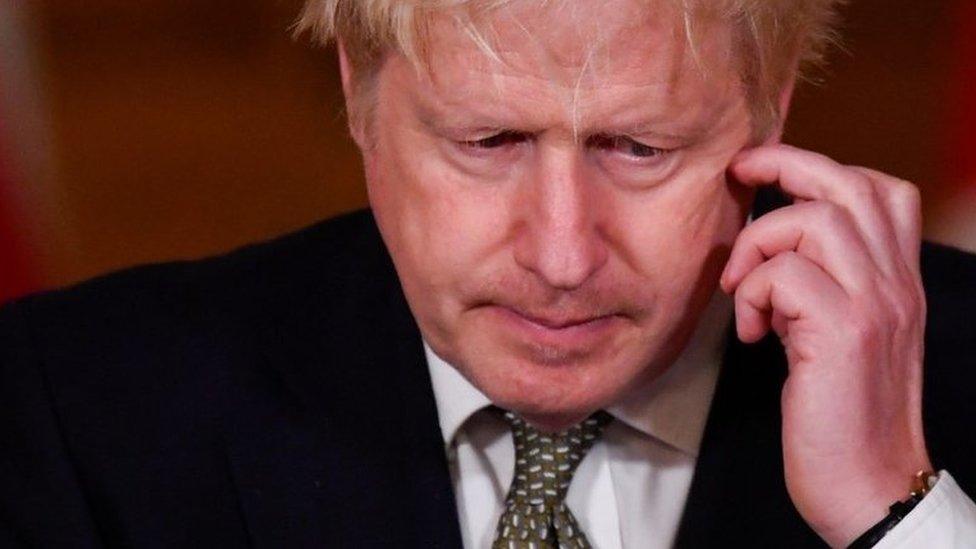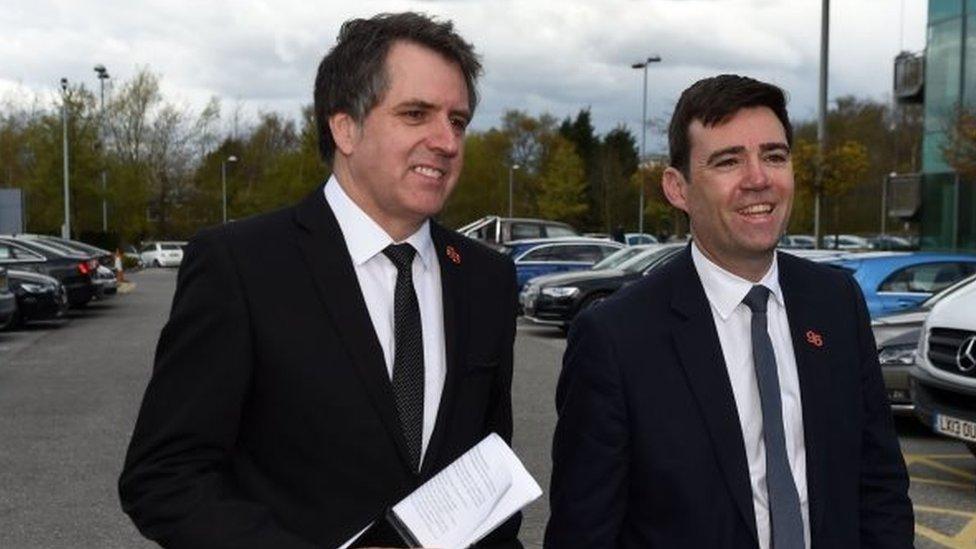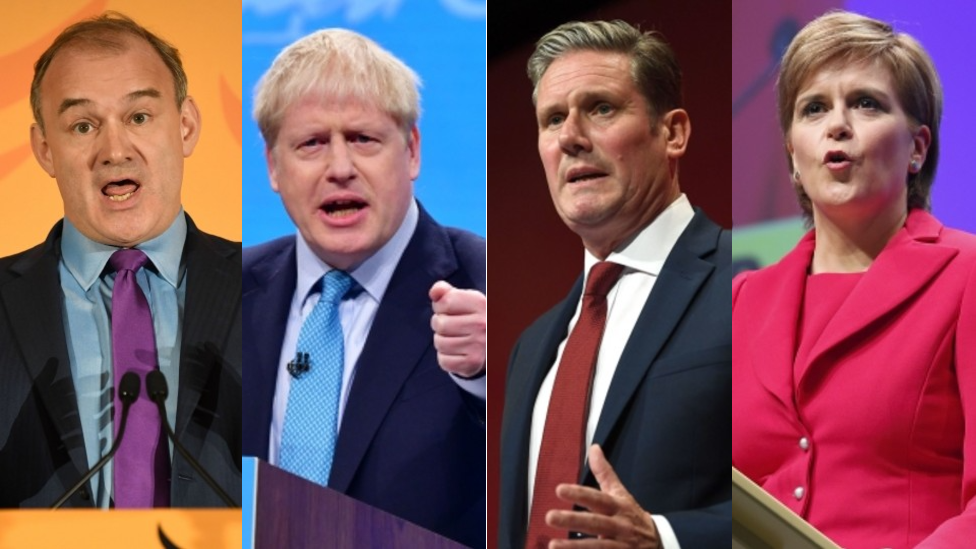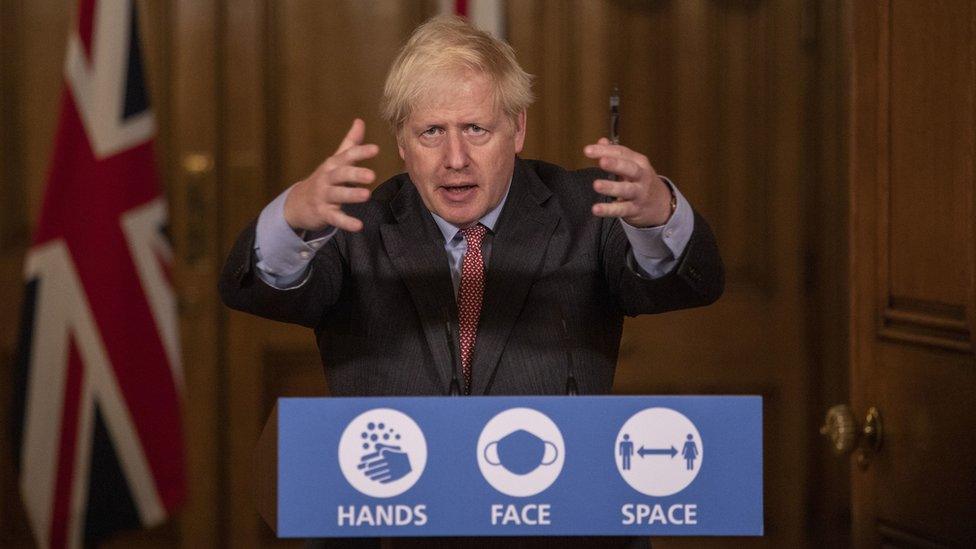Coronavirus: Who's in charge?
- Published

Without needlessly causing any offence to Steve Rotheram, you may never have heard of him before now, unless you are one of the 1.5 million or so people who live in the large area surrounding Liverpool.
Or you live in the constituency of Liverpool Walton he used to represent.
Or you were a keen observer of the politics around Jeremy Corbyn's eventually ill-fated leadership of the Labour Party - Rotheram had the dubious pleasure of being the link between Mr Corbyn and the Labour backbenches when they were in a state of war.
Boris Johnson, however, wanted in a prime-time press conference to make sure that everyone watching knew all about Mr Rotheram, mentioning his name on multiple occasions, praising him for his strong leadership and collaboration, as the mayor for the only region in England tonight that will enter the toughest form of lockdown.
Within a few minutes, Mr Rotheram, no natural fan of this government, went online to say that it was "totally false" to suggest that the measures had been agreed, saying they had been imposed on the area by central government.
Complaints and tensions
Both men, of course, are politicians. It's not necessarily a vote-winner for a leader in Liverpool to have a Tory PM shower love and praise on him from such a public pulpit.
There is a reason, however, why the tension between these two, even if it's just political chest-beating, does actually matter as a symbol of what is going on.
For many months there have been complaints and tensions between local and national government, and also the governments in Cardiff, Edinburgh and Belfast.
The way power has been dispersed around the UK in the last decade, including in England, has changed how politics is done in the UK.
And the good, bad and the ugly have been on display. There is a much wider discussion (I promise we'll have one some time on here!) about how the pandemic has exposed, revealed and maybe altered where power really lies.

Mayors Steve Rotheram and Andy Burnham have both had disagreements with the government
But, for now, we can see the blindingly obvious: the government is trying to bind local leaders to the handling of the pandemic.
Many of them have been calling to be more involved for ages and believe they could offer more pragmatic help. Whether on test-and-trace or business support, the criticisms that the government has taken a top-down approach go back almost as long as the pandemic itself.
But it was also really striking at the Downing Street press conference that the Chief Medical Officer for England, Chris Whitty, made it crystal clear he didn't think the new top level of restrictions would be enough to cope with the pandemic unless local health officials introduced extra limits on top.
That was in itself a pretty stark, over-to-you moment, devolving responsibility for whether the spread of the disease slows to those on the ground.
'Many conversations'
But it was also political. One cabinet minister told me this would be a "test of devolution", that the mayors "can't just be commentators".
There is deep frustration at the conundrum of devolution too.
Yes, local areas have been given significantly more resources. Yes, there have been lots of conversations and consultations.
But the basic decisions are still being taken by central government. One local leader who is not a regular critic of the government told me: "There have been many, many conversations, but the decisions are clearly taken by the government."
Sometimes Westminster politicians look at local leaders, prominent in their own areas, and complain they have power without real responsibility.
Tonight they might fear they are being asked to take responsibility without the real power after all.
Some more revelations
PS What we didn't know before the press conference was that the government's scientific committee (SAGE) was recommending back on 21 September that much tighter rules were required to slow down the rise in cases. Read the details here., external
Its meeting minutes include these suggestions:
A package of interventions will need to be adopted to prevent this exponential rise in cases
Single interventions are unlikely to be able to reduce incidence
If schools are to remain open, then a wide range of other measures will be required
The shortlist of non-pharmaceutical interventions to be considered for immediate introduction includes:
A circuit-breaker (short period of lockdown) to return incidence to low levels
Advice to work from home for all those who can
Banning all contact within the home with members of other households (except members of a support bubble)
Closure of all bars, restaurants, cafes, indoor gyms and personal services (eg hairdressers)
All university and college teaching to be online unless absolutely essential.
The government has stopped way short of anything like imposing these restrictions nationally. It's a totally different political atmosphere to when the pandemic began and it was keen to make the point continually about following the scientific advice.
The dilemmas are not straightforward. Taking actions like these would have huge impacts on the economy if they happened everywhere. But it's very likely that the revelations from SAGE, sadly an hour or so after the press conference, will provoke political upset.
They might also explain why, earlier, Prof Whitty was so keen to point out that he doesn't believe that the Tier 3 restrictions will be enough to control the pandemic on their own.
- Published8 October 2020

- Published2 October 2020

